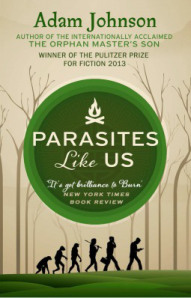What language will the future speak?

Parasites Like Us
by Adam Johnson
I found this book slow to start but by the end it had a real effect on me – by which I mean I couldn’t stop thinking about it to the extent that I had nightmares! But it is the story of an apocalyptic adventure, so that’s probably a good sign. I think. It’s also a comedy – a very dark one.
The story is narrated by Hank Hannah, an anthropologist at a small university in South Dakota, moderately successful, mostly unhappy and alternately obsessed with and completely disinterested in his own work. We learn on page one that two major events are coming – he’s going to prison and some kind of major apocalyptic event is going to wipe out most humans (along with pigs and birds, apparently). However, most of the novel is about Hank’s life leading up to those events.
“The cold was a force, a pressure you felt against your eyes, and along the frosted buildings the prison lights shone sodium and shrill, casting stiff, cement-coloured halos off the corrugated roofs. The rising moon had its say too – upon open expanses, in the branches of trees, its tincture recast the night in hues of indigo, iodine and tulle.”
Hank’s area of special interest is the Clovis – people who inhabited the Americas from 11,000 to 9000 years ago. He wrote a book contending that the Clovis were responsible for mass extinctions because they over-hunted and is now half-heartedly raking through reams of data to back this up. But one of his graduate students – Eggers – is so fascinated by the subject that he has decided to live for a year as a Clovis, using only Paleolithic technology (which seems to involve being smelly and a lot of illegal hunting). Hank’s other graduate student – Trudy – has her own contentious theory about the lack of Clovis art, and is also the subject of Hank’s inappropriate crush.
There is quite a lot of scientific exposition in this book, but I couldn’t quite figure out Johnson’s attitude toward science. None of the scientists is entirely likeable and they are pretty devil-may-care with the scientific method. With the book’s overtones of dark humour, I did wonder if Johnson was mocking the scientific establishment as a whole, or just certain aspects of it, or certain types of people within it. However, the choice of Hank’s study subject was clearly carefully chosen to have parallels with the current-day story and indeed has made me curious enough to look up the Clovis. (Incidentally, the title can be read two ways – human beings as the parasites, or that parasites like to live off humans, which may give you an idea of the intellectual humour at work here.)
“To speak of the dead is to conjure them, and it would be a crime to beckon them from their graves, to prance them around in some conga line of history before vanquishing them back to the cold, as if their lives were no more than footnotes in the tale of another.”
Hank himself was also difficult to get a handle on. He has an overinflated ego and is generally selfish, but he’s also a very smart, poetic and thoughtful man who is grieving for his stepmother. He has many unattractive traits but in the end I did sort of root for him. Because he narrates the story, and because there’s lots of stuff about hunting and survival, this feels at time quite a masculine book. But it’s saved from being too masculine or at all sexist by the character of Trudy. She’s an athletic, no-nonsense, mixed-heritage woman who rejects Hank’s advances while remaining his friend. She also shows real enthusiasm for the science, certainly more so than Hank. In fact, if anything, I might argue that the women in this book are a little too perfect, but then as it’s a first-person narrative they’re all seen via Hank and he is just the type to idolise women.
“Ten thousand years from now, when people exhumed her bones, what would they know of her life, her spirit?…Would they know of her love of plants, that she longed to see Egypt…Should I have put medicine bottles and a bedpan in her grave, so the future would understand her final struggle? Should I have chiseled out her story, start to finish, in granite, and what language will the future speak?”
Once the root of the Apocalypse becomes clear, the narrative really gets going. There are sections that, as an animal lover, I found toughgoing, but on reflection I think it’s only right that those parts were a bit grim and if anything this proves that Johnson is an animal lover.
However, what really won me over to this book was this line:
“I needed to implore of her, If you leave me, what will evoke you? I should have demanded, Tell me what movie I should watch, what tune I should sing, what book should be open on my chest when I wish to fall asleep and dream of you. Tell me, dear colleagues of tomorrow, tell me that in the future these are questions no-one’s afraid to ask.”
This book was not initially published in the UK, but after Johnson’s second novel The Orphan Master’s Son won the 2013 Pulitzer Prize for Fiction, a UK publisher picked up both this and Johnson’s collection of short stories, Emporium, which I already have waiting on my TBR. It certainly goes to prove that winning prizes does some good for authors, if it gets good-but-neglected books out there into people’s hands.
First published in the USA by Viking Penguin in 2003.
First published in the UK by Transworld in 2014.
Source: This book was kindly sent to me by the publisher in return for an honest review.